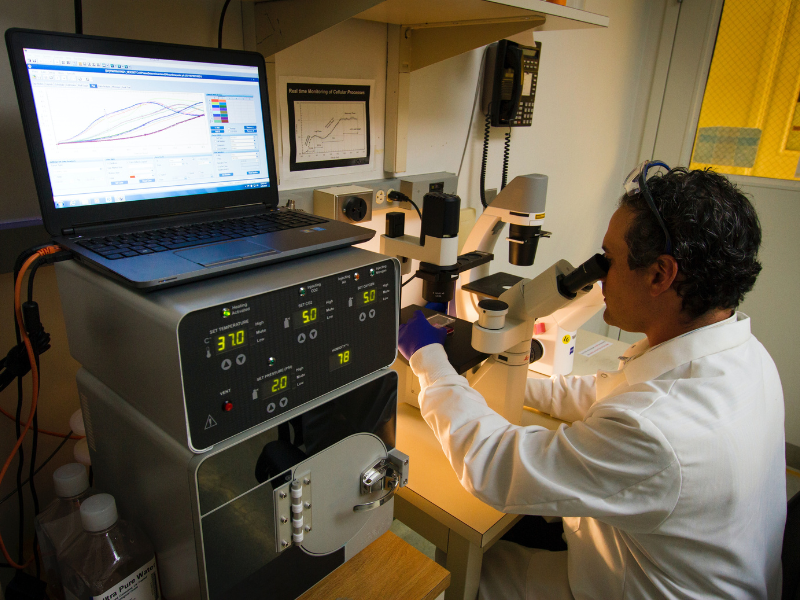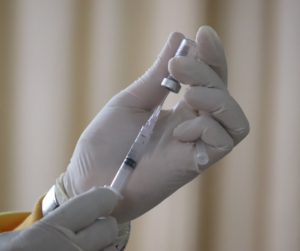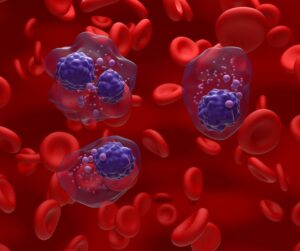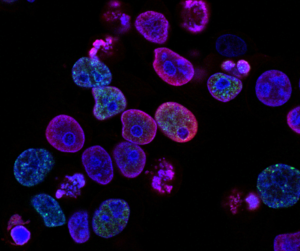Manali Bhave, MD
Triple-negative breast cancer (TNBC) accounts for 15% to 20% of all breast cancer cases1 and is characterized by aggressive disease associated with early recurrence and high mortality. Current advances in neoadjuvant therapy for early-stage TNBC focus on improving the pathological complete response (pCR) and escalating adjuvant systemic therapies in those with residual disease.2
The current guidelines for treating high risk, early-stage TNBC emphasize neoadjuvant and adjuvant therapies including immunotherapy.3,4In stage II/III TNBC,neoadjuvant chemotherapy with immunotherapy is the preferred approach for tumor shrinkage of the primary breast mass and/or cancerous lymph nodes before surgery, leading to improved surgical outcomes. Patients who have a pCR after neoadjuvant therapy also have a longer event-free survival and overall survival (OS). Adjuvant pembrolizumab [Keytruda, Merck] (up to 9 cycles) is recommended and may be given in combination or sequentially prior to adjuvant capecitabine (8 cycles) in patients with residual disease. Adjuvant olaparib [Lynparza, AstraZeneca] for 52 weeks may also be considered to reduce the risk of recurrence in patients who carry a germline BRCA 1 or 2 mutation.
Advances in TNBC Therapies and Future Directions
Recent clinical trials show progress in advancing TNBC therapies and improving patient outcomes.
- The KEYNOTE-522 trial is a Phase 3 study evaluating the efficacy and safety of pembrolizumab in patients with early-stage TNBC. Patients with previously untreated stage II or III TNBC were randomly assigned to receive neoadjuvant chemotherapy (paclitaxel and carboplatin followed by anthracycline-based chemotherapy) with pembrolizumab versus placebo. The pCR rates were significantly higher among the patients who received pembrolizumab plus neoadjuvant chemotherapy. The FDA approved pembrolizumab for high-risk, early-stage TNBC in combination with chemotherapy as neoadjuvant treatment and then continued as a single agent after surgery.5,6
- In the neoadjuvant space, the I-SPY2 trial assesses the efficacy of novel drugs in an adaptive clinical trial model designed to minimize time required to evaluate an experimental agent. Participants are classified into one of 10 molecular subtypes and then randomly assigned to a study arm. This trial uses adaptive design and molecular characteristics to match patients with specific treatments.7,8
- OlympiA investigates adjuvant olaparib in patients with germline BRCA 1 or 2 mutation with high-risk early-stage TNBC. With 3.5 years of median follow-up, OlympiA demonstrates statistically significant improvement in disease-free survival and OS with adjuvant olaparib compared with placebo. The FDA approved olaparib for the adjuvant treatment of adult patients with germline BRCA-mutated human epidermal growth factor receptor 2 (HER2)-negative high-risk, early breast cancer who have been treated with neoadjuvant or adjuvant chemotherapy based on these results.9,10
- The Phase 3 ASCENT-05 trial will evaluate adjuvant sacituzumab govitecan [Trodelvy, Gilead] plus pembrolizumab versus pembrolizumab with or without capecitabine in patients with TNBC and residual disease after neoadjuvant therapy and surgery. The trial aims to determine whether this treatment can reduce the risk of disease recurrence and improve OS.11
- The Phase 3 Tropion Breast-03 trial will evaluate adjuvant datopotamab deruxtecan [AstraZeneca] with or without durvalumab [Imfinzi, AstraZeneca] versus investigator’s choice of therapy in patients with TNBC and residual disease after neoadjuvant therapy and surgery. 12 The trial aims to determine whether this treatment can reduce the risk of disease recurrence and improve OS.
Conclusion
These clinical trials and updated data are crucial in advancing the understanding and treatment of early-stage TNBC. They provide valuable insights into the effectiveness and safety of various treatment approaches, with the ultimate goal of improving patient outcomes.

- Triple-negative breast cancer (2023, May 15). Cleveland Clinic. https://my.clevelandclinic.org/health/diseases/21756-triple-negative-breast-cancer-tnbc.
- Mouh, F. Z., Mzibri, M. E., Slaoui, M., & Amrani, M. (2016). Recent Progress in Triple Negative Breast Cancer Research. Asian Pacific journal of cancer prevention : APJCP, 17(4), 1595–1608.
- Triple-negative breast cancer. (2021, October 28). Johns Hopkins Medicine. https://www.hopkinsmedicine.org/health/conditions-and-diseases/breast-cancer/triple-negative-breast-cancer.
- Treatment of triple-negative breast cancer (2022, April 12). American Cancer Society. https://www.cancer.org/cancer/types/breast-cancer/treatment/treatment-of-triple-negative.html.
- Schmid, P., Cortes, J., Pusztai, L., McArthur, H., Kümmel, S., Bergh, J., Denkert, C., Park, Y. H., Hui, R., Harbeck, N., Takahashi, M., Foukakis, T., Fasching, P. A., Cardoso, F., Untch, M., Jia, L., Karantza, V., Zhao, J., Aktan, G., Dent, R., … KEYNOTE-522 Investigators (2020). Pembrolizumab for Early Triple-Negative Breast Cancer. The New England Journal of Medicine, 382(9), 810–821.
- FDA approves pembrolizumab for high-risk early-stage triple-negative breast cancer. U.S. Food and Drug Administration. https://www.fda.gov/drugs/resources-information-approved-drugs/fda-approves-pembrolizumab-high-risk-early-stage-triple-negative-breast-cancer.
- Nanda, R., Liu, M. C., Yau, C., Shatsky, R., Pusztai, L., Wallace, A., Chien, A. J., Forero-Torres, A., Ellis, E., Han, H., Clark, A., Albain, K., Boughey, J. C., Jaskowiak, N. T., Elias, A., Isaacs, C., Kemmer, K., Helsten, T., Majure, M., Stringer-Reasor, E., … Esserman, L. J. (2020). Effect of Pembrolizumab Plus Neoadjuvant Chemotherapy on Pathologic Complete Response in Women With Early-Stage Breast Cancer: An Analysis of the Ongoing Phase 2 Adaptively Randomized I-SPY2 Trial. JAMA oncology, 6(5), 676–684.
- Wolf, D. M., Yau, C., Wulfkuhle, J., Brown-Swigart, L., Gallagher, R. I., Lee, P. R. E., Zhu, Z., Magbanua, M. J., Sayaman, R., O’Grady, N., Basu, A., Delson, A., Coppé, J. P., Lu, R., Braun, J., I-SPY2 Investigators, Asare, S. M., Sit, L., Matthews, J. B., Perlmutter, J., … van ‘t Veer, L. J. (2022). Redefining breast cancer subtypes to guide treatment prioritization and maximize response: Predictive biomarkers across 10 cancer therapies. Cancer cell, 40(6), 609–623.e6.
- Geyer, C. E., Jr, Garber, J. E., Gelber, R. D., Yothers, G., Taboada, M., Ross, L., Rastogi, P., Cui, K., Arahmani, A., Aktan, G., Armstrong, A. C., Arnedos, M., Balmaña, J., Bergh, J., Bliss, J., Delaloge, S., Domchek, S. M., Eisen, A., Elsafy, F., Fein, L. E., … OlympiA Clinical Trial Steering Committee and Investigators (2022). Overall survival in the OlympiA phase III trial of adjuvant olaparib in patients with germline pathogenic variants in BRCA1/2 and high-risk, early breast cancer. Annals of oncology : official journal of the European Society for Medical Oncology, 33(12), 1250–1268.
- Mandapati, A., & Lukong, K. E. (2023). Triple negative breast cancer: approved treatment options and their mechanisms of action. Journal of cancer research and clinical oncology, 149(7), 3701–3719.
- National Library of Medicine (U.S.). (2023, November 2). Study of sacituzumab govitecan-hziy and pembrolizumab versus treatment of physician’s choice in patients with triple-negative breast cancer who have the residual invasive disease after surgery and neoadjuvant therapy. Identifier: NCT05633654. https://classic.clinicaltrials.gov/ct2/show/NCT05633654.
- Bardia, A. & Pusztai, L. (2023, April 27). Therapy (ICT) for Triple-Negative Breast Cancer (TNBC) with Residual Disease Following Neoadjuvant Therapy. Cancer Network. https://www.cancernetwork.com/view/31-tip-tropion-breast03-datopotamab-deruxtecan-dato-dxd-durvalumab-vs-investigator-s-choice-of-therapy-ict-for-triple-negative-breast-cancer-tnbc-with-residual-disease-following-neoadjuvant-therapy.







